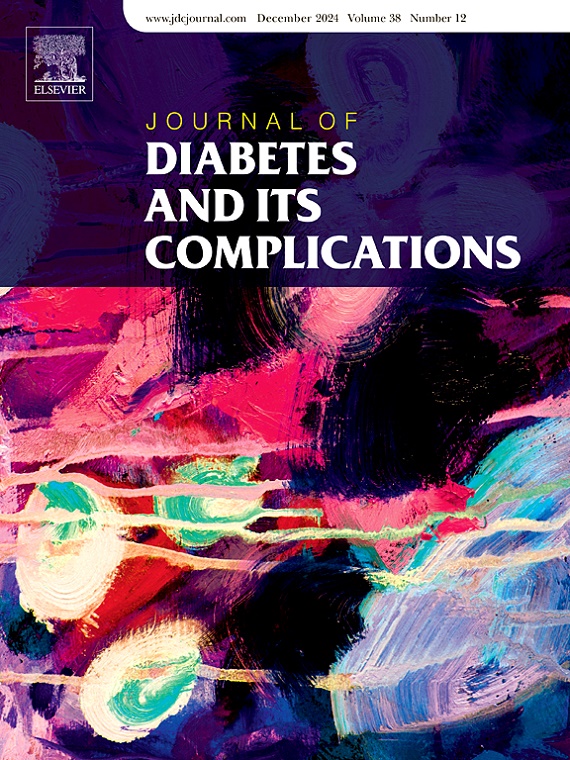Effect of colchicine on platelet aggregation in patients with type 2 diabetes: Results from a randomized placebo-controlled trial
IF 3.1
3区 医学
Q3 ENDOCRINOLOGY & METABOLISM
引用次数: 0
Abstract
Background
Patients with type 2 diabetes face an increased risk of cardiovascular disease (CVD), partly due to a prothrombotic state with increased platelet reactivity. Colchicine, an anti-inflammatory drug, has shown promise in reducing cardiovascular events, but its effects on platelet function remain unclear. This trial evaluated the effect of low-dose colchicine on platelet aggregation and platelet activation indices in patients with type 2 diabetes.
Methods
In this double-blind, randomized, placebo-controlled trial, 100 participants with type 2 diabetes and previous CVD or a least one cardiovascular risk factor were randomized in a 1:1 ratio to receive either colchicine (0.5 mg/day) or placebo for 26 weeks. Platelet aggregation was assessed using multiple electrode aggregometry expressed as aggregation units (AU) × minutes (mins). Adenosine diphosphate (ADP), arachidonic acid (AA), and thrombin-receptor-activating peptide (TRAP) were used as agonists.
Results
A total of 95 participants completed the trial. After 26 weeks, no significant differences were observed between the colchicine and placebo groups in platelet aggregation induced by ADP (ΔADP-aggregation: 49, 95 % CI: −15;113 AU x mins, p = 0.08), AA (ΔAA-aggregation: −4, 95 % CI: −24;16 %, p = 0.69), or TRAP (ΔTRAP-aggregation: −3, 95 % CI: −11;4 %, p = 0.39). Similarly, no between-group differences were found in platelet parameters, including platelet count mean platelet volume, and immature platelet fraction.
Conclusions
Low-dose colchicine did not significantly alter platelet aggregation or platelet activation indices in patients with type 2 diabetes. These findings suggest that colchicine's cardioprotective effects are not mediated through direct effects on platelet function.
Clinical trial registration information
EudraCT-no.: 2021-003525-30
Link: https://www.clinicaltrialsregister.eu/ctr-search/trial/2021-003525-30/DK
秋水仙碱对2型糖尿病患者血小板聚集的影响:一项随机安慰剂对照试验的结果
背景:2型糖尿病患者患心血管疾病(CVD)的风险增加,部分原因是血小板反应性增高的血栓形成前状态。秋水仙碱是一种抗炎药物,在减少心血管事件方面有希望,但它对血小板功能的影响尚不清楚。本试验评估了低剂量秋水仙碱对2型糖尿病患者血小板聚集和血小板活化指标的影响。方法在这项双盲、随机、安慰剂对照试验中,100名患有2型糖尿病和既往心血管疾病或至少一种心血管危险因素的参与者按1:1的比例随机接受秋水仙碱(0.5 mg/天)或安慰剂治疗26周。血小板聚集用多电极聚集法评估,聚集单位(AU) ×分钟(min)。二磷酸腺苷(ADP)、花生四烯酸(AA)和凝血酶受体激活肽(TRAP)作为激动剂。结果共有95名参与者完成了试验。26周后,在ADP (ΔADP-aggregation: 49, 95% CI:−15;113 AU x min, p = 0.08)、AA (ΔAA-aggregation:−4,95% CI:−24;16%,p = 0.69)或TRAP (ΔTRAP-aggregation:−3,95% CI:−11;4%,p = 0.39)诱导的血小板聚集方面,秋水仙碱组与安慰剂组之间无显著差异。同样,各组间的血小板参数,包括血小板计数、平均血小板体积和未成熟血小板分数均无差异。结论慢剂量秋水仙碱对2型糖尿病患者血小板聚集和血小板活化指标无显著影响。这些发现表明秋水仙碱的心脏保护作用不是通过直接影响血小板功能介导的。临床试验注册信息链接:https://www.clinicaltrialsregister.eu/ctr-search/trial/2021-003525-30/DK
本文章由计算机程序翻译,如有差异,请以英文原文为准。
求助全文
约1分钟内获得全文
求助全文
来源期刊

Journal of diabetes and its complications
医学-内分泌学与代谢
CiteScore
5.90
自引率
3.30%
发文量
153
审稿时长
16 days
期刊介绍:
Journal of Diabetes and Its Complications (JDC) is a journal for health care practitioners and researchers, that publishes original research about the pathogenesis, diagnosis and management of diabetes mellitus and its complications. JDC also publishes articles on physiological and molecular aspects of glucose homeostasis.
The primary purpose of JDC is to act as a source of information usable by diabetes practitioners and researchers to increase their knowledge about mechanisms of diabetes and complications development, and promote better management of people with diabetes who are at risk for those complications.
Manuscripts submitted to JDC can report any aspect of basic, translational or clinical research as well as epidemiology. Topics can range broadly from early prediabetes to late-stage complicated diabetes. Topics relevant to basic/translational reports include pancreatic islet dysfunction and insulin resistance, altered adipose tissue function in diabetes, altered neuronal control of glucose homeostasis and mechanisms of drug action. Topics relevant to diabetic complications include diabetic retinopathy, neuropathy and nephropathy; peripheral vascular disease and coronary heart disease; gastrointestinal disorders, renal failure and impotence; and hypertension and hyperlipidemia.
 求助内容:
求助内容: 应助结果提醒方式:
应助结果提醒方式:


